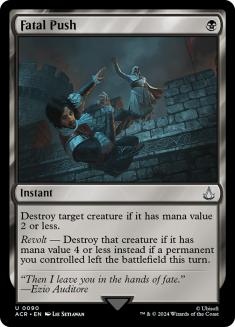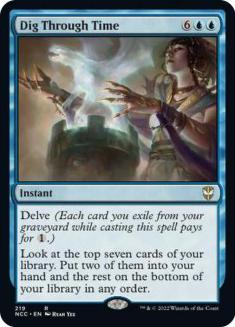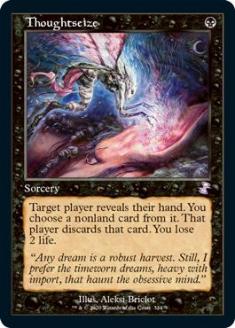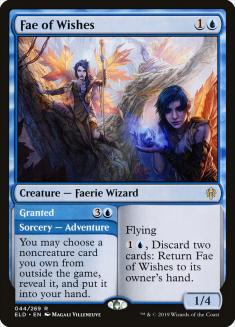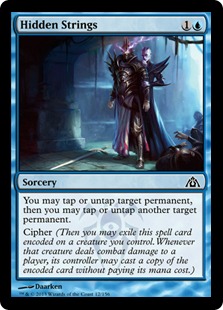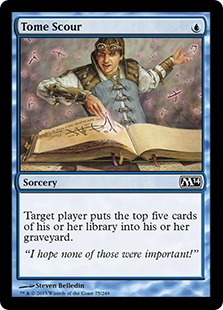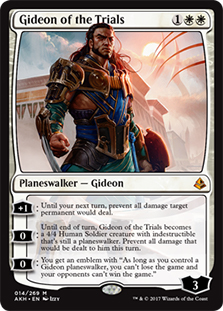Now this is a story all about how
My deck got flipped turned upside down
And I’d like to take a minute
Just sit right there
I’ll tell you how to beat Dimir Inverter, playing fair or unfair!
Pioneer has a new deck to beat, and it’s a doozy. Sort of a Splinter Twin with even higher-quality individual creature components, Dimir Inverter looks like a worthy villain and a possible ban-worthy deck, given enough time for the best build to come out.
Why such an early and assertive call of a possible Tier 0 archetype? After all, metagames can correct, right? Clearly the deck blew up this past weekend, but why is it a ban-worthy candidate? Simple. Just look at the pieces involved in this monster. The best one-mana spells in Pioneer, Fatal Push and Thoughtseize, both fit in perfectly. The best card selection spell, Dig Through Time, finally has a place in Pioneer where it’s at its best, finding whatever piece is missing from the combo.
Then the individual components are incredible. Thassa’s Oracle is an Omenspeaker when you need to dig for lands and block early aggression, while Inverter of Truth can recycle a dead Oracle and pop it right back on top for a clean Turn 5 win. Aggro decks have a nearly insurmountable obstacle with that sequence.
Jace, Wielder of Mysteries also shines as a card draw engine that also wins the game with Inverter of Truth. Deceiver Exarch and Pestermite look awful in comparison to a four-drop that draws extra cards and demands an immediate answer!
This deck plays the best cards consistently, offers a hard-to-disrupt combo, and has the card selection to play whatever cards it needs to in order to transform and beat the answers thrown its way. It’s throwing basically every red flag possible.
The precise numbers on all the Dimir Inverter lists are up in the air, but Piotr Glogowski got second at Players Tour Brussels, the deck took up five of eight slots in the elimination rounds in Nagoya, and every single team in Top 4 at the Richmond Open ran Dimir Inverter in their Pioneer seat.
Creatures (8)
Planeswalkers (3)
Lands (25)
Spells (24)

The deck is here to stay, and now competitors in Phoenix and the Team Constructed Open in Philadelphia this weekend need to figure out if they can fight the menace or if they’ll be forced to pick it up. While the safe call is indeed playing Dimir Inverter (after all, its stats were phenomenal), there are a variety of other options that proved that they could go toe-to-toe with this new machine.
Lotus Breach
If you want to play the other broken deck in Pioneer, look no further than the Lotus Breach deck that Brent Vos and Pascal Vieren played, and Brent took to the Top 4.
Creatures (15)
Lands (23)
Spells (22)

What’s the deal with this version of the Breach deck? In a nutshell, Vos and Vieren discovered something amazing. You don’t need to play Chronic Flooding to have a deterministic kill with a Lotus Field and one other land on the battlefield, and an Underworld Breach active. Get rid of that garbage piece of cardboard!
You can simply use Fae of Wishes to get Tome Scour, and loop Tome Scours with Hidden Strings. Hidden Strings nets two mana and requires you to exile three cards from your graveyard, while you can use Tome Scour twice (remember you have Underworld Breach!) to mill yourself for ten cards at the cost of only six cards in your graveyard and two mana. Each loop nets you one extra card in your graveyard and ten cards off the top. At the end, you cast a Thassa’s Oracle and win on the spot!
By evening out the deck and cutting the Chronic Flooding, these incredible deck designers broke the format a secret second way, which means that Theros Beyond Death only broke Pioneer twice. Compared to Throne of Eldraine‘s Oko, Thief of Crowns and Once Upon a Time, it seems like the new set is holding its own.
Now, from the standpoint of a pure goldfish, Lotus Breach matches or even beats Dimir Inverter with no problem. It generally goes off easily on Turn 5, but can get a Turn 4 kill with the highest-quality draws. It also plays Lost Legacy, which it can find with Fae of Wishes to rip the Inverters out of the deck and slow down an opponent to the point of irrelevance.
Of course, Dimir Inverter has a solid amount of disruption in Thoughtseize, Thought Erasure, Drown in the Loch, Mystical Dispute, and Censor. One might suspect that Inverter is therefore far ahead in the matchup, but part of the power of Lotus Breach is how easily it shrugs off one or two pieces of disruption. A single Thoughtseize might not even damage the goldfish turn, to be frank. Two discard spells and a Turn 6 Inverter win will probably do it, but many of the Dimir deck’s draws don’t come together so perfectly. And with Pore Over the Pages, Dig Through Time, and Strategic Planning to keep churning for action, discard spells alone will not win the game.
Lotus Breach puts Dimir Inverter to the test, a test that it passes at most half the time. If you like your combo decks to ignore the opponent a bit more, this is where you want to be.
Bant Spirits
Two exact copies of Bant Spirits made Top 8 at Brussels, piloted by Mattia Rizzi and Valerio Luminati. If Rizzi’s name keeps coming up in these exposes of interesting Pioneer tech, it should come as no surprise. The man is one of Italy’s secret crushers, and will almost certainly be in the Rivals League next year. He is an incredible deckbuilder and player, and his Bant Spirits deck is one of the few to show a clean gameplan that intuitively beats Dimir Inverter on its own.
Creatures (32)
- 3 Rattlechains
- 4 Spell Queller
- 3 Selfless Spirit
- 4 Mausoleum Wanderer
- 4 Nebelgast Herald
- 4 Supreme Phantom
- 4 Empyrean Eagle
- 4 Spectral Sailor
- 2 Brazen Borrower
Lands (24)
Spells (4)

Nothing too special going on here, just a disruptive aggro deck with evasion and piles of countermagic. Spell Queller might just be the best card in Pioneer against Dimir Inverter, shutting down Jace, Wielder of Mysteries and the namesake 6/6 for a backbreaking tempo and card gain. With Mystical Dispute and Disdainful Stroke on backup, it’s no surprise that this is the answer to a metagame flooded with combo decks. If Thassa’s Oracle and Underworld Breach broke Pioneer, Bant Spirits is the archetype to pick up the pieces and hold the format together.
Sultai Delirium
It was Joel Larsson who ended up besting Glogowski in the finals of Brussels this past weekend, after manhandling Mattia Rizzi’s Bant Spirits deck via judicious use of Liliana, the Last Hope. This might be the most fun deck in the format, and certainly makes the best use of Uro, Titan of Nature’s Wrath. After all, if Oko, Thief of Crowns is banned, surely a new Simic mythic rare can take its place!
Creatures (19)
- 1 Scavenging Ooze
- 2 Courser of Kruphix
- 4 Satyr Wayfinder
- 3 Jace, Vryn's Prodigy
- 1 Tireless Tracker
- 1 Emrakul, the Promised End
- 1 Ishkanah, Grafwidow
- 1 Walking Ballista
- 1 Murderous Rider
- 4 Uro, Titan of Nature's Wrath
Planeswalkers (3)
Lands (23)
Spells (15)

A bit of disruption, a bit of lifegain, a bit of card advantage, a small tutor package, an Emrakul endgame…this deck has it all! The most value-laden midrange pile in the format, Sultai Delirium is so customizable it can be built to properly combat everything, including the premier combo deck and the premier flash deck built to prey on said combo deck.
Personally, I’d like to see one or two more copies of Liliana, the Last Hope in the 75 somewhere, as well as an Unmoored Ego or two for fighting Dimir Inverter and Lotus Breach, but for a first-week effort, this is remarkably deep and generally powerful.
If you simply must play midrange, Larsson has built the deck for you. Customize it as you wish, perfect those sideboard plans, and Sultai Delirium will reward you with interactive games and consistent wins.
Sram Auras
From the most expensive to the cheapest competitive deck in Pioneer, it’s a wild Sram, Senior Edificer brew. And you just have to love a Ken Yukuhiro list. This man is a maniac who just can’t stop winning, and his innovative and unexpected deck showcases that. If Dimir Inverter went from meme deck to top deck, Sram Auras has the potential to do the same. A mix between a combo deck and a Heroic deck, the fast clock and disruption behind this archetype make it a genuine contender, and on a reasonable budget as well.
Creatures (17)
- 2 Favored Hoplite
- 4 Sram, Senior Edificer
- 3 Aphemia, the Cacophony
- 4 Alseid of Life's Bounty
- 4 Hateful Eidolon
Lands (20)
Spells (23)

Ken, like some Mono-White Devotion players, chose to incorporate Gideon of the Trials as a hate card against Dimir Inverter. With a Gideon emblem in your possession, it’s impossible for the Dimir deck to win without getting two Inverters on the battlefield or finding a Hero’s Downfall. Some lists don’t have a way to effectively beat a Gideon at all, or only run a couple of answers for the card.
In addition to the Gideons in the sideboard, Ken’s list does something that few other decks do well in Pioneer: it disrupts Dimir Inverter while effectively pressuring it. Mono-Black Aggro does a decent job, though without any graveyard hate it’s tough to beat a Thassa’s Oracle into Inverter of Truth. Mono-Red Aggro is not particularly disruptive, but it throws a heck of a clock on. And Izzet Ensoul pressures incredibly hard, but can be picked apart by a mix of discard and sideboard removal.
Sram Auras seems to be the best of the bunch, while also leveraging draft commons like Sentinel’s Eyes and Karametra’s Blessing to incredible effect. Who doesn’t love a deck like that?
Nykthos Blue
Sam Black wrote about this hidden gem last week, and Shintaro Ishimura even took his blue Devotion engine and blended it with the Dimir Inverter combo for a strong finish in Nagoya. If there’s one more centerpiece chock-full of untapped potential in Pioneer, it’s this one. Nykthos, Shrine of Nyx is simply too powerful to ignore.
The list I like right now is one that Sam Pardee took out for a spin on Magic Online (MTGO). A similar list crushed me in online testing, and it’s worth a second look for anyone desperate for something powerful and unusual for Pioneer this weekend.
Creatures (18)
- 2 Thassa, God of the Sea
- 2 Reflector Mage
- 2 Agent of Treachery
- 4 Gadwick, the Wizened
- 2 Brazen Borrower
- 2 Thassa, Deep-Dwelling
- 4 Thassa's Oracle
Planeswalkers (1)
Lands (24)
Spells (17)

I’d like to play some number of Sidisi’s Faithful in the sideboard to combat the aggro decks, as the 0/4 body is impressive against Scrapheap Scrounger and Goblin Chainwhirler, while the exploit ability does incredible work against any permanent with an Ensoul Artifact on it. A single pip of blue mana is nothing to sneeze at in a Nykthos deck, either!
The fact that decks like this one can still be completely undeveloped and ready for tuning is heartening in this age of rapid information transfer. Pioneer has done a lot to reinvigorate the old brewing and tuning spirit, and it’s wonderful to see.
The format still has powerhouses like Izzet Ensoul, Mono-Black Aggro, Mono-Red Aggro, and Five-Color Niv-Mizzet, but a metagame has formed around the most powerful cards from Theros Beyond Death. It behooves us to get one step ahead for the next week of events.


